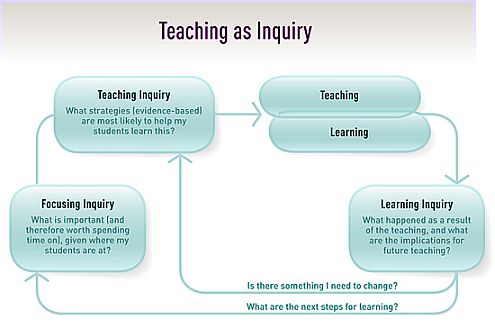An inquiry process for teaching
Effective classical studies teachers plan strategically, teach, and then modify their teaching in order to better achieve the desired learning. They need to be constantly asking themselves:
- where their students are in their learning
- how they can help them progress
- how their teaching impacts on their students’ learning.
They use this information to decide:
- What is it important for me to be teaching now (focusing inquiry)?
- What strategies are most likely to help my students learn this (teaching inquiry)?
- What worked and for whom, and what are the implications for my teaching (learning inquiry)?
A cycle of inquiry can help ensure that we don’t carry on doing what is no longer working or is not working for particular students.

Teaching as inquiry diagram from NZC.
The New Zealand Curriculum offers a brief summary of pedagogical approaches that are applicable to all teaching, including teaching in classical studies. For a much more comprehensive but very user-friendly guide, see
Effective Pedagogy in Social Sciences/Tikanga ā Iwi: Best Evidence Synthesis Iteration (BES). The authors of this synthesis identify four 'mechanisms' that are at the heart of effective teaching and learning.
Four mechanisms that facilitate learning in the social sciences
TOP
Facilitating teacher learning
Effective pedagogy requires teachers to inquire into the impact of their teaching. Using the Teaching as Inquiry model will support this important and sometimes challenging process. As a result, the teacher’s professional learning goals will be driven by their learners’ needs.
Creating an action plan that connects to a wide range of support networks is an effective means of working towards professional goals. Teachers are encouraged to make links with their colleagues and relevant communities, for example, heads of department, specialist classroom teachers, gifted and talented co-ordinators, and professional development leaders.
Opening classroom doors for other teachers to observe, and vice versa, is also an excellent way to enhance practice. Often the most effective and inquiring teachers are the ones right next door. At the heart of effective action planning is collaboration with other teachers.
Making connections with families and whānau is another way teachers can access valuable support while inquiring into how they can better meet the needs of their learners.
Teachers can also access professional learning support by:
Teachers aiming to develop their academic or professional skills could:
- take postgraduate papers in classical studies
- apply for study grants and professional development awards, including those provided by NZACT, PPTA, and the Ministry of Education
- take on extra responsibilities related to assessment and resource production, for example, moderating or marking external examinations for the
New Zealand Qualifications Authority (NZQA).
Last updated September 12, 2017
TOP


